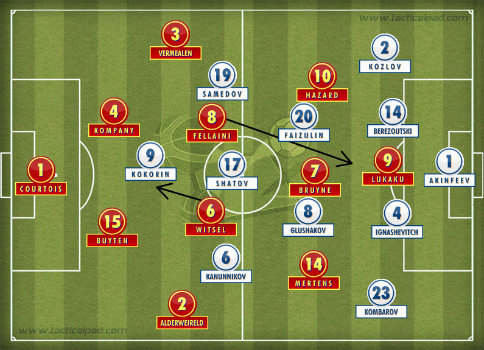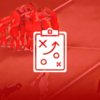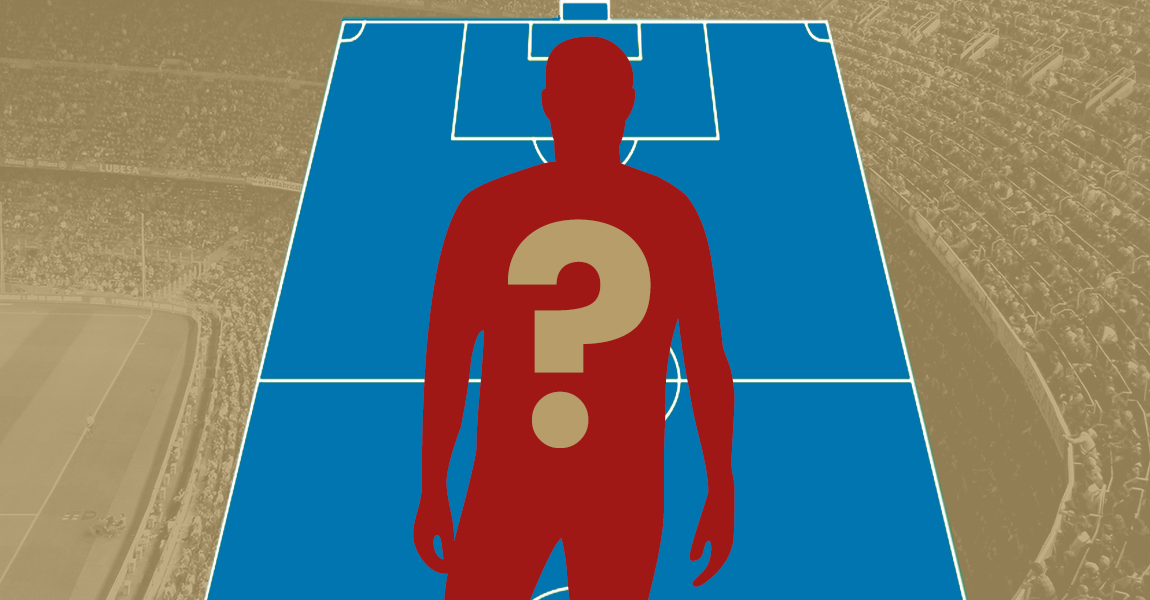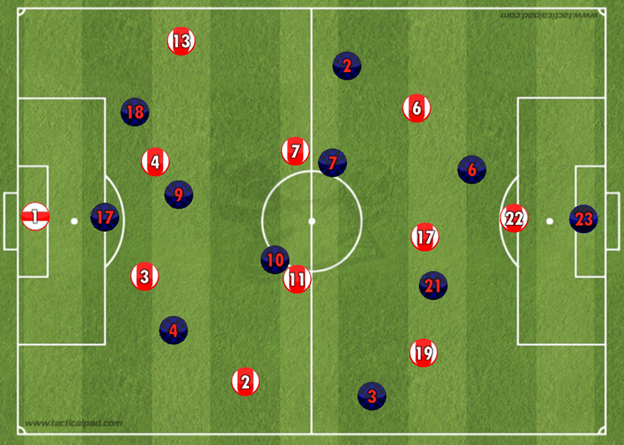A game which was fairly fought out for 80 minutes, was suddenly stolen away from a team that showed it’s individual brilliance. A game in which man to man ability was the thin line between three points and zilch.
Formation & Line Ups
Belgium(4-3-3): Courtois, Alderweireld, Van Buyten, Kompany, Vermaelen (Vertonghen 31’), Witsel, De Bruyne, Fellaini, Mertens (Mirallas 75′), Lukaku (Origi 57′), Hazard
Witsel dropping deep, Fellaini pushing forward as second striker ,
Russia(5-1-3-1): Akinfee, Kozlo (Eshchenko 62′), Berezutskiy, Glushakov, Ignashevich, Kombarov, Fayzulin, Samedov (Kerzakhov 90′), Kanunnikov, Shatov (Dzagoev 83′), Kokorin
Goals: Origi 88′

ANALYSIS
Belgium had a plan that wasn’t required
As the game began it slowly became evident that Belgium wanted to use Lukaku and Fellaini’s physical attributes. Witsel would sit deep and distribute as De Bruyne carried the ball forward with the help of Fellaini. The big Belgian would often end up playing as a second striker, as Hazard and Mertens along with De Bruyne kept lobbing balls into the box in the hopes of finding someone. This worked against Algeria, but it wouldn’t work against Russia.
RELATED ARTICLES
Russia’s 5-1-3-1 meant that when balls are lobbed into the box, there was always going to be a 3-v-1 or 3-v-2 situation, which effectively neutralized any significant aerial threat. Belgium transition into a 4-2-4 while attacking with Mertens easily being the standout player in the first half as he kept answering questions only to be denied again and again. Fellaini was often confused about what his role was, and was often found in multiple position with the striker role being the most prominent one when the balls reached wide to be crossed. This kind of ideology would have been more suited for Algeria but Russia were a different kind of team altogether.
Russia identified Hazard as the main man
Eden Hazard was double and triple marked whenever he touched the ball. He was already in shackles with the game plan Wilmots seemed to impose on the Belgians but he was always hounded the moment he touched the ball. Russia effectively wanted to close down the proverbial doors of creativity as Belgium kept passing the ball around aimlessly as Russia pressed higher and higher.
This allowed Mertens to shine who eventually lost his glow as he made only 2 successful passes in the second half before being replaced by Mirallas. As Belgium transitioned into a 4-5-1 defensively, Hazard and Mertens were busy helping out their respective full-backs , but only Mertens had the complete freedom to push up without the fear of being beaten up like a Piñata that had been slow to arrive at a Cinco de Mayo party. However Hazard finally did turn the odds around as he became more lively in the last 15 minutes as he set up an 88’th minute winner.
Belgium used Russia’s high pressure game against them
It was quite evident that Russia were pressing relatively high with their four man midfield coupled with the central center-back who weren’t afraid to roam out of position to pick out Belgian runners. Now Belgium aren’t complete strangers to this kind of philosophy. They themselves dished out systems revolving around high pressure during the qualifiers.
For a second it did look like Russia’s plan would work. They threw players forward after winning the ball back and caused overloads laterally so that the Belgian defense found it hard to organize. The striker would pull the center-backs away as the winger penetrated in between the full-back. The Belgian defense became even more vulnerable. Kokorin missed a potential match winner in the 43rd minute, a miss that Cappello will rue as a very costly one. They were more reactive than proactive however, and focused too much on the weakness of the Belgians. They never had the opportunity to properly emphasise themselves like the Belgians did for short periods, one of which lead to a brilliantly structured goal.
The negative side to any system that revolves its game plan around pressing high and being aggressive is fatigue and lots of open space. Belgium gave it their everything in the last 15 minutes with the added impetus from a highly motivated Kevin Mirallas. The introduction of Mirallas and Origi turned their fortunes around and Russia were asking for it. The amount of space in between the midfield and the defensive line when the latter was pressing was huge. The defenders would be destroyed by a sudden burst of pace, something which Lukaku couldn’t provide.
The Belgians worked hard defensively, and were rewarded in the 88th minute. After that they were back to the system that brought them to Brazil. They counter-attacked as Russia pushed for an equalizer and opened up even more.
Key Player of the Match
Divock Origi surprised everyone when he was picked to go to Brazil. This move was mostly due to Benteke’s absence but the 19 year old Lille striker looks determined to impress everyone. He was given zero credit for his performance that was overshadowed by Mertens and Fellaini, despite him coming on right in between them. His pace was definitely a huge factor, which was evident from his ability to leave the Russians on the floor as he raced past them. His versatility is another important attribute as he drifted wide to allow Fellaini and De Bruyne to push up and Hazard to cut in more often than not. He gives Marc Wilmots a different option in a desperate time and is probably one of the most effective super sub’s in the World Cup.
Where does this leave them?
With 6 points out of 6 in their group, Belgium are now into the round of 16 and can indeed be happy with the performance they have put up after returning to the World Cup. However with a team such as Germany on the horizon, Marc Wilmots has a lot of homework to do before he sends his men to battle once again. Russia still have slim chances of qualifying to the next round, they have to get all three points against Algeria and hope other result work in their favour.
This article was written by Sherry Philips. Follow him on Twitter @TransitionPhase

























































